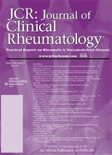
Archives of Rheumatology
Scope & Guideline
Innovative insights into the world of rheumatology.
Introduction
Aims and Scopes
- Rheumatic Diseases and Their Management:
A core focus on the diagnosis, treatment, and management strategies for various rheumatic diseases including rheumatoid arthritis, systemic lupus erythematosus, and psoriatic arthritis. - Patient-Centered Research:
Emphasis on studies exploring patient experiences, quality of life, and health literacy in relation to rheumatic diseases, aiming to enhance patient care. - Innovative Therapeutic Approaches:
Exploration of novel therapeutic interventions, including biological agents, small molecules, and other treatment modalities for rheumatic conditions. - Comorbidities and Systemic Implications:
Research on the systemic effects of rheumatic diseases and their associations with comorbidities such as cardiovascular diseases, metabolic syndrome, and psychological factors. - Epidemiological Studies:
Focus on the epidemiology of rheumatic diseases, including prevalence, risk factors, and demographic studies to inform public health approaches. - Diagnostic Advances:
Investigations into the diagnostic tools and methodologies for more accurate and timely diagnosis of rheumatic diseases. - Multidisciplinary Approaches:
Encouragement of interdisciplinary research that integrates various scientific fields to address complex issues in rheumatology.
Trending and Emerging
- Impact of COVID-19 on Rheumatic Diseases:
An increasing number of studies addressing the implications of the COVID-19 pandemic on rheumatic disease management, vaccination responses, and patient outcomes, highlighting the need for adaptive strategies in rheumatology. - Biomarkers and Personalized Medicine:
A trend towards identifying biomarkers for disease activity and treatment response, reflecting a shift towards personalized medicine in rheumatology. - Multidisciplinary Care Approaches:
Growing literature on the integration of various healthcare disciplines, including psychology and nutrition, in managing rheumatic diseases, emphasizing a holistic approach to patient care. - Telemedicine and Remote Monitoring:
Emerging interest in telemedicine and remote monitoring tools for managing rheumatic diseases, especially in the context of the ongoing pandemic and the need for accessible healthcare. - Psychosocial Aspects of Rheumatic Diseases:
Increased focus on the psychosocial factors affecting patients with rheumatic diseases, including mental health, quality of life, and patient education. - Epidemiological and Public Health Research:
A notable rise in research examining the epidemiological aspects of rheumatic diseases, including risk factors, prevalence, and population health implications.
Declining or Waning
- Traditional Clinical Trials:
There appears to be a decrease in classical randomized controlled trials for established treatments, as the field shifts towards real-world evidence and observational studies. - Single-Disease Focus Studies:
Research focusing solely on individual rheumatic diseases without considering comorbidities or systemic implications is becoming less prevalent, reflecting a broader interest in holistic patient care. - Basic Science Investigations:
There is a waning interest in basic science studies that do not translate to clinical applications, as the journal prioritizes research with direct implications for patient care. - Static Diagnostic Criteria Studies:
Research solely focused on validating static diagnostic criteria is diminishing, as more emphasis is placed on dynamic and personalized approaches to diagnosis.
Similar Journals

Current Rheumatology Reviews
Pioneering insights for modern rheumatology.Current Rheumatology Reviews is an esteemed journal dedicated to publishing comprehensive reviews on advancements in the field of rheumatology. Established by Bentham Science Publishers, this journal has become a vital resource for researchers, clinicians, and students seeking to stay abreast of the latest developments and therapeutic strategies from 2006 to 2024. Located in the United Arab Emirates, it caters to a global audience, delivering insights that have been pivotal in shaping clinical practices. With an impact factor reflective of its Q3 status in Rheumatology by 2023, the journal ranks #46 out of 73 in the Scopus database, positioning it in the 37th percentile in the discipline. Although it operates without open access, its high-quality content ensures that each article undergoes rigorous peer review, making the Current Rheumatology Reviews a trusted platform for disseminating critical research findings and reviews that drive forward the understanding and treatment of rheumatic diseases.

Arthritis & Rheumatology
Connecting Researchers to Transformative DiscoveriesArthritis & Rheumatology is a leading journal dedicated to the advancement of knowledge in the fields of rheumatology, immunology, and allergy. Published by WILEY in the United Kingdom, this prestigious journal boasts an impressive impact factor and a prominent reputation, ranking in the Q1 category across multiple disciplines, including Immunology and Rheumatology. With its high ranking of 4th out of 73 in Rheumatology and notable standings in related fields, it serves as a crucial platform for researchers, healthcare professionals, and scholars to disseminate groundbreaking findings. The journal embraces an Open Access model, enhancing the accessibility of vital research to a global audience and ensuring that knowledge dissemination is maximized. Since its inception in 2014, Arthritis & Rheumatology has been at the forefront of impactful research, fostering collaboration and innovation in tackling complex challenges within these medical disciplines. Researchers looking to explore the latest advancements and engage with cutting-edge studies in these fields will find this journal to be an essential resource.

RHEUMATIC DISEASE CLINICS OF NORTH AMERICA
Navigating the complexities of rheumatology for better outcomes.Rheumatic Disease Clinics of North America is a premier journal published by W B Saunders Co-Elsevier Inc, dedicated to advancing the field of rheumatology through comprehensive and impactful research. With an ISSN of 0889-857X and an E-ISSN of 1558-3163, this esteemed publication has been disseminating knowledge since its inception in 1987, and continues to guide clinicians and researchers alike through its insightful articles and case studies. Positioned in the 2023 Q2 quartile for Rheumatology, it ranks #31 out of 73 journals in the Scopus category of Medicine _ Rheumatology, reflecting a commendable impact factor and relevance in the academic community. Although it does not offer open access options, the journal ensures that subscribers have access to cutting-edge research and reviews that address contemporary challenges and advancements in rheumatic disease. With its authoritative content, Rheumatic Disease Clinics of North America serves as a vital resource for those striving to improve patient care and clinical outcomes in the ever-evolving landscape of rheumatology research.

Open Access Rheumatology-Research and Reviews
Empowering Researchers with Open Access Insights.Open Access Rheumatology-Research and Reviews, published by DOVE MEDICAL PRESS LTD, is a distinguished journal that has been a vital part of the rheumatology field since its inception in 2009. With an ISSN of 1179-156X, this journal is dedicated to disseminating groundbreaking research and comprehensive reviews in the discipline of rheumatology, making it an essential resource for researchers, clinicians, and students alike. It boasts an impressive Q3 ranking in the Rheumatology category for 2023, reflecting its relevance and quality within a highly competitive landscape, where it ranks in the 51st percentile among its peers as indicated by the Scopus Ranks. As an open-access platform, it ensures that critical findings and insights are easily accessible to a global audience, promoting collaboration and knowledge sharing. The journal's scope includes a wide range of topics within rheumatology, aimed at advancing understanding and treatment of musculoskeletal disorders and autoimmune diseases. Its headquarters is located in New Zealand, positioning it as a key player in the international research community.

CURRENT OPINION IN RHEUMATOLOGY
Exploring the Latest Advances in RheumatologyCurrent Opinion in Rheumatology, published by Lippincott Williams & Wilkins, stands as a vital resource in the field of rheumatology. Since its inception in 1989, this prestigious journal has been at the forefront of disseminating cutting-edge research, with a notable Q1 ranking in the 2023 Rheumatology category and an impressive Scopus rank of 7 out of 73, placing it in the 91st percentile. The journal's commitment to presenting insightful reviews and critical analyses of recent advancements and treatment strategies makes it an essential read for professionals, researchers, and students dedicated to the study of rheumatic diseases. Although not an open-access journal, Current Opinion in Rheumatology continues to foster an informed dialogue within the academic community through its high-impact content, ensuring that the latest developments and practices are accessible to those at the vanguard of rheumatology research.

ZEITSCHRIFT FUR RHEUMATOLOGIE
Innovating the future of rheumatology through scholarly discourse.ZEITSCHRIFT FUR RHEUMATOLOGIE, published by Springer Heidelberg, serves as a vital platform in the field of rheumatology, providing researchers, clinicians, and students with cutting-edge findings and discussions related to the diagnosis, treatment, and management of rheumatic diseases. Since its inception in 1974 and continuing until 2024, this journal retains its commitment to disseminating significant scientific work within this specialized domain. Although it is currently categorized in the Q4 quartile for Rheumatology and ranks 47 out of 73 in Scopus, reflecting its burgeoning presence, the journal is dedicated to evolving and gaining prominence in the academic community. By offering valuable insights and fostering scholarly discourse, ZEITSCHRIFT FUR RHEUMATOLOGIE plays a crucial role in advancing rheumatology research and enhancing patient care practices worldwide. The journal presents an opportunity for its readers to engage with contemporary studies and enrich their understanding of rheumatic ailments.

CLINICAL AND EXPERIMENTAL RHEUMATOLOGY
Advancing knowledge in rheumatology and immunology.CLINICAL AND EXPERIMENTAL RHEUMATOLOGY is a prestigious journal published by CLINICAL & EXPER RHEUMATOLOGY, dedicated to advancing the field of rheumatology and immunology. With a rich history dating back to 1983, the journal serves as a critical platform for researchers, clinicians, and professionals seeking to disseminate and discuss innovative findings in these rapidly evolving areas. Featuring an impressive Q2 ranking in both Immunology and Allergy, as well as Rheumatology, this journal is recognized for its high-quality contributions, placing it among the top tier of academic publications. Operating without an open access model, CLINICAL AND EXPERIMENTAL RHEUMATOLOGY is headquartered in Pisa, Italy, and publishes articles that undergo rigorous peer review to ensure excellence in research. This journal is an invaluable resource for those dedicated to improving patient outcomes through evidence-based practice in rheumatology, immunology, and related fields.

Modern Rheumatology
Innovating Insights in Rheumatologic MedicineModern Rheumatology is a premier journal dedicated to advancing the field of rheumatology through high-quality peer-reviewed research. Published by Oxford University Press, this journal reflects the latest developments in rheumatologic medicine, catering to researchers, clinicians, and students alike. With an H-Index highlighting its scholarly impact, Modern Rheumatology occupies a notable position, ranking Q2 in both the fields of Medicine and Rheumatology in 2023, and is listed among the top 25 journals in its category by Scopus. Spanning from the year 2000 to 2024, the journal features a diverse array of topics aimed at addressing current challenges and innovations in the field. Although it does not offer Open Access, it provides essential insights for professionals seeking to stay abreast of evolving treatment modalities and research breakthroughs. Located in the heart of the United Kingdom, Modern Rheumatology is a vital resource for anyone committed to enhancing the understanding and treatment of rheumatic diseases.

JCR-JOURNAL OF CLINICAL RHEUMATOLOGY
Empowering Professionals Through Cutting-edge ResearchJCR-Journal of Clinical Rheumatology, published by Lippincott Williams & Wilkins, is a premier outlet dedicated to the field of rheumatology, recognized for its contributions and relevance among medical journals. Boasting an impact factor reflective of its vital role in disseminating innovative research, it currently holds a Q2 category ranking in Medicine (miscellaneous) and a Q3 ranking in Rheumatology as of 2023. With its convergence years spanning from 1995 to 2024, the journal aims to foster the advancement of knowledge in clinical practices, therapeutic advances, and patient management strategies concerning rheumatic diseases. Researchers, professionals, and students can access a wealth of benchmark studies and peer-reviewed articles, enhancing their understanding and collaboration within this dynamic field. By bridging clinical insights with rigorous research, the JCR-Journal of Clinical Rheumatology remains an important resource for advancing the understanding of rheumatologic disorders and improving patient care.

Current Rheumatology Reports
Shaping the future of patient care through research.Current Rheumatology Reports is a premier journal dedicated to advancing the field of rheumatology, published by Springer. With an esteemed Q1 category ranking in Rheumatology as of 2023 and a remarkable Scopus rank of 6 out of 73, this journal stands at the forefront of research dissemination, boasting an impressive percentile ranking in the 92nd. Since its inception in 1999, Current Rheumatology Reports has provided a critical platform for the latest findings in rheumatological diseases, treatment strategies, and clinical practices. Although it currently does not offer Open Access options, the journal's rigorous peer-review process ensures high-quality publications that are essential for researchers, clinicians, and students alike. By keeping the community informed of key developments, this journal plays a vital role in shaping contemporary rheumatological research and practice, thereby facilitating the advancement of patient care worldwide.